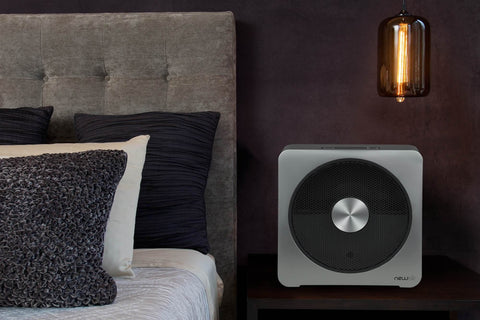Are Electric Heaters Better Than Gas? How to Choose the Right Space Heater for Your Home
When it comes to choosing a space heater for your home, you have a major decision to make: Do you want an electric or a gas heater? Choosing your fuel source will have implications for efficiency, safety and convenience, so you'll want to consider this choice carefully.
To help you decide, it's important to understand the main differences in how gas and electric heating systems function and how they need to be installed. Let's get started.
Space Heating With a Gas System: The Pros and Cons
Gas heaters operate by burning fossil fuels. These could be either natural gas or propane, depending on whether you have access to city-sponsored infrastructure or need to truck in your own propane to store in a tank for your personal use. Once ignited, the gas burns steadily to provide instant heat to the room where it's installed. Fans may help distribute the hot air as well.
Because gas heaters require a fuel source, they need to be hooked up to a gas or propane line to function. They also need to be properly vented to remove carbon monoxide from your home.
The Pros
Energy Savings
Gas systems are often praised for their energy efficiency and relatively low operating costs. Though energy prices fluctuate over time, natural gas generally costs far less than the electricity required to produce the same amount of heat. Over time, a high-efficiency gas furnace or heater can save you a good deal of money on your heating bills.
Environmentally Responsible
Believe it or not, natural gas might be a relatively eco-friendly choice. Because you'll use less of the fuel to stay warm, you can lower your carbon footprint. Also, most electricity comes from non-sustainable power plants, so there may not be an advantage unless you purchase solar- or wind-powered electricity for your home.
Works During Power Outages
Many home heating systems that use gas can function just fine without electricity, which means you'll never have to shiver through a power outage in the middle of the winter. If you live in a blizzard-prone area, this is a huge bonus.
Gets Hot Fast
Much like a gas range, igniting the flame of a gas furnace or space heater provides pretty much instant heat, so you won't have to wait while the heating element gradually warms up.
Works Well Outdoors
New gas and propane heaters are great for using outdoors. Whether you choose a propane camping stove or want to hook up a patio heater to extend your outdoor grilling season, these specialty heaters work in all types of weather.
The Cons
Higher Upfront Costs
Generally speaking, a gas heater will cost more than a comparable electric model. This is because the equipment is more complicated, since it requires a combustion system. Because gas furnaces and heaters need to be connected to a gas line and a ventilation system, they often come with higher installation costs as well — especially if you rely on a professional to get the job done.
Carbon Monoxide Risks
Any appliance that uses a combustible fuel — whether a gas water heater, dryer or space heater — can produce CO as a byproduct. If CO is improperly vented and builds up in your home, it can cause carbon monoxide poisoning — with potentially deadly results.
Not All Can Be Used Indoors
It's important to shop carefully if you're looking or a gas space heater. Unvented gas heaters cannot be used safely indoors due to the risk of CO build-up and having a semi-open flame in your living room or bedroom.
Electric Space Heaters: The Pros and Cons
Portable electric heaters come in several varieties, but they all work by using electricity to warm up the heating element rather than burning gas or propane as a fuel source. The heating element may be metal, ceramic or oil, as when an oil-filled radiator uses oil to conduct heat rather than as a combustible fuel like a home heating oil furnace does. Additionally, some electric heaters heat the room via radiation, while others use a fan for convection to move hot air around.
No matter what kind of electric heater you choose, the pros and cons are generally the same when compared to gas heaters.
The Pros
Portability
Electric space heaters are very portable. Because they don't require a gas line or any special venting, it's easy to move them from room to room whenever you wish to bring the heat where you need it most. Portable heaters are also ideal for anyone living in temporary housing like dorm rooms and apartments, since you can easily take them with you when you move.
Plug & Play Convenience
For most electric portable heaters, there is no real installation to worry about: All you need to do is plug it in and turn it on. This makes a electric heater a great choice for anyone — not just avid DIYers with the skills to do a more involved installation.
Affordability
Because electric heaters are generally less complex than their fuel-burning counterparts, they cost less up front. You can get warm without breaking the bank this winter if you go electric.
Safe for Indoor Use
Electric space heaters shouldn't be exposed to water or adverse weather conditions to keep them from shorting out, but they're perfect for indoor use. Because they don't emit any dangerous gases or have an open flame, they're ideal for residential applications.
Better Safety Features
Electric heaters are designed to be used indoors, so they often come with a more robust slate of safety features than gas heaters meant to be used outside. Look for thermal fuses and anti-tip devices that will shut your heater off if it overheats or falls over. These features help prevent accidental house fires.
The Cons
Cost More to Operate
As mentioned above, electricity is more expensive than gas, so it will cost more to use your space heater in the long run. You can reduce your heating costs by looking for Energy Star-rated space heaters and choosing models with a thermostat and timers so they aren't running 24/7.
Fire Risk
Electric heaters draw a lot of power, and this can lead to a risk of fire if your home's electrical system can't handle the load. According to the Department of Energy, space heaters account for about 25,000 fires each year. To reduce your risk, never use your heater with an extension cord or leave it on after you leave the room. All space heaters should be kept at least 3 feet away from flammable items.
Slower to Warm
Unlike the instant heat of a gas flame, it can take some time for en electric heater to operate at full capacity. Heating elements take time to warm up, which also means you'll be drawing more power for a longer time period until you start to the feel the heat.
Gas Vs. Electric Unit: Choosing the Best Solution for Your Home
So which is the better option: electric or gas? It all depends on what you need and where you plan to use your space heater. Use the checklist below for a quick look at what's best for you.
Choose an Electric Space Heater If . . .
1. You plan to move and want to take your heater with you.
2. You'd like to be able to move the heater from room to room.
3. You don't have a lot of money to spend up front.
4. Electricity is included in your rent.
5. You aren't permitted to make structural changes to your living area.
6. You live with children or pets and will need additional safety features.
Choose a Gas Space Heater If . . .
1. You don't want to spend a lot on your energy bills each month.
2. You want to reduce your carbon footprint.
3. You already have easy access to gas or propane.
4. You plan to use the heater outdoors.
5. You don't mind installing a permanent ventilation system.
6. You plan to use the heater where children or animals can't touch it.
Choosing the right space heater doesn't have to be hard. Once you take into account your location, energy costs and need for safety features, your decision should become much more clear. After you decide between electricity and gas, you're ready to shop for a specific make and model by looking at each heater's unique features and benefits to get the best one for your home.
Browse Portable Space Heaters




0 comments